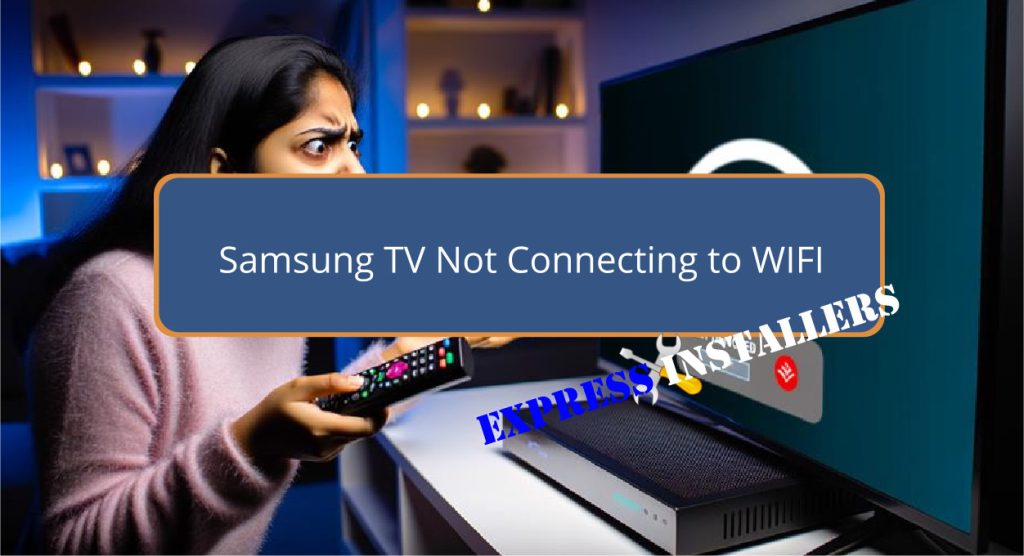
If your Samsung TV is not connecting to Wi-Fi, first troubleshoot potential interference and make sure both TV and router firmware are up-to-date. Check network status via the TV’s Network Status menu and confirm other devices can connect to the Wi-Fi. Verify you are using the correct Wi-Fi credentials and check for router features like MAC address filtering. Restart your router and TV, and refresh network settings to eliminate configuration errors. If issues persist, contacting Samsung Support or visiting an authorized service center can provide detailed assistance. For a thorough guide on these steps, explore further.
Quick Summary
- Verify Wi-Fi credentials and ensure the correct network and password are entered.
- Restart your router by unplugging it for 30 seconds and then reconnecting.
- Access the Network Status menu on the Samsung TV to check for connection issues.
- Ensure the TV firmware and router firmware are up to date.
- Reset the network settings on the Samsung TV and re-enter Wi-Fi credentials.
Identifying Connection Issues
Identifying connection issues begins with determining whether the problem lies between the Samsung TV and the router or between the router and the internet service.
Start by troubleshooting interference; make sure other electronic devices are not causing signal disruption.
Next, check for firmware updates both on the TV and the router, as outdated software can lead to connectivity problems.
Additionally, test the connection by linking another device to the router to see if it experiences similar issues. This helps isolate whether the problem is specific to the TV.
Verify the router’s functionality and, if necessary, contact your internet service provider to rule out external network issues.
Checking Network Status
Examining the Network Status on your Samsung TV is an essential step in diagnosing internet connectivity issues. Start by accessing the Network Status menu to review the connection statuses of the TV, router, and internet.
Blue dots signify a proper connection, whereas red X marks indicate issues. To troubleshoot, inspect physical cables and restart your router. If the router-to-internet connection persists as problematic, contact your internet service provider.
Additionally, consider troubleshooting interference sources that may disrupt the Wi-Fi signal. Lastly, make sure your TV’s firmware is up-to-date by checking for firmware updates, as outdated software can sometimes cause connectivity problems.
Verifying Wi-Fi Credentials
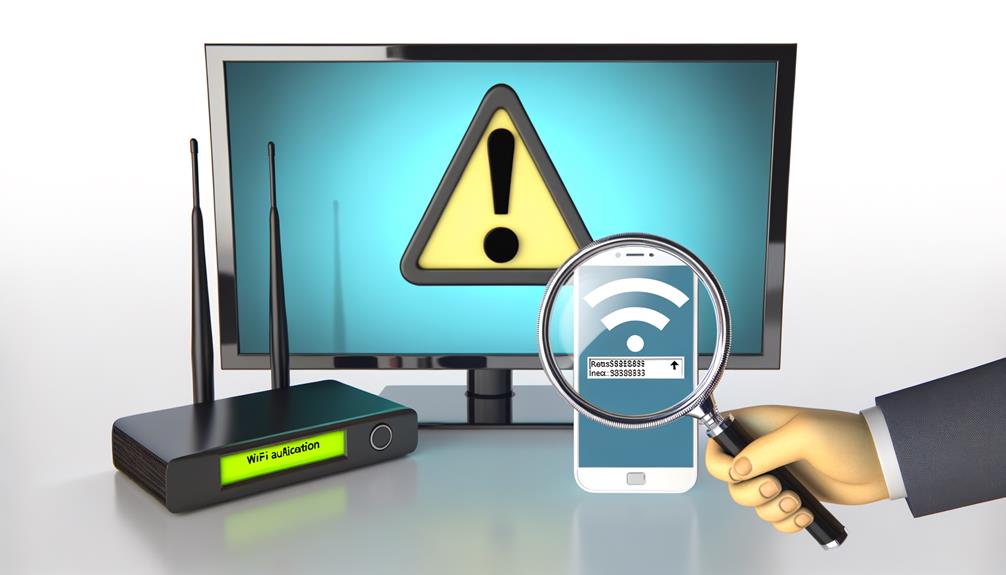
Ensuring that your Samsung TV is connected to the correct Wi-Fi network and that the password entered is accurate is essential for resolving connectivity issues.
Begin by checking the Wi-Fi network name (SSID) to confirm the TV is attempting to connect to the right network.
Next, verify that the Wi-Fi password entered on the TV matches the network’s actual password.
As part of your troubleshooting steps, make sure there are no additional security features, such as MAC address filtering, that could be causing connectivity issues.
Additionally, double-check that the Wi-Fi network is visible and within range of the TV.
These network troubleshooting steps are vital for identifying potential issues and maintaining a stable connection.
Restarting Your Router
Often, restarting your router can effectively resolve connectivity issues between your Samsung TV and the Wi-Fi network. This simple router troubleshooting step can clear temporary glitches and refresh the connection.
To restart your router:
- Unplug the router: Disconnect it from the power source for at least 30 seconds.
- Plug it back in: Reconnect the power and wait for the router to fully reboot.
- Confirm connections: Verify that the router is properly connected to the internet.
- Reattempt connection: Try reconnecting your Samsung TV to the Wi-Fi network.
- Monitor performance: Evaluate if the connection issue persists.
Refreshing Network Settings
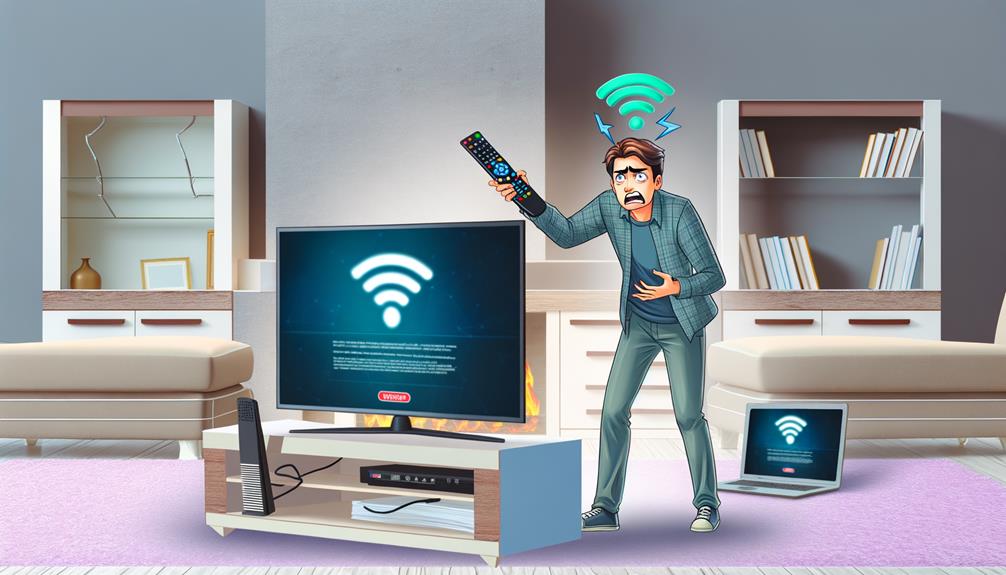
Resetting the network settings on your Samsung TV is a straightforward troubleshooting step that can address Wi-Fi connectivity issues by clearing any existing network configuration errors. This method is an essential part of network troubleshooting, as it allows the TV to discard potentially corrupted or outdated configurations that may be causing connectivity problems.
To perform this reset, navigate to the TV’s settings menu, locate the network settings, and choose the option to refresh or reset the network. Be prepared to re-enter your Wi-Fi network credentials after the reset. This quick and easy solution often resolves Wi-Fi issues without the need for more advanced interventions, enabling a smoother connection experience.
After completing the reset, reconnect your TV to Wi-Fi to determine if the issue is resolved.
Moving Router Closer
Positioning the router closer to your Samsung TV can greatly enhance Wi-Fi signal strength and improve connection stability. Best wireless connectivity is typically achieved when the router is within 15.2 meters of the TV.
Physical obstacles and signal interference from other electronic devices can degrade Wi-Fi performance. Hence, reducing these obstructions is essential.
To further enhance the signal, consider the following:
- Minimize physical barriers: Make sure there are no walls or large objects between the router and the TV.
- Avoid electronic interference: Keep the router away from microwaves, cordless phones, and other electronics.
- Use a Wi-Fi extender: This can help amplify the signal in larger spaces.
- Update firmware: Make sure both router and TV have the latest updates.
- Check IP settings: Adjust settings in the Network Settings menu for best performance.
Restarting Samsung TV
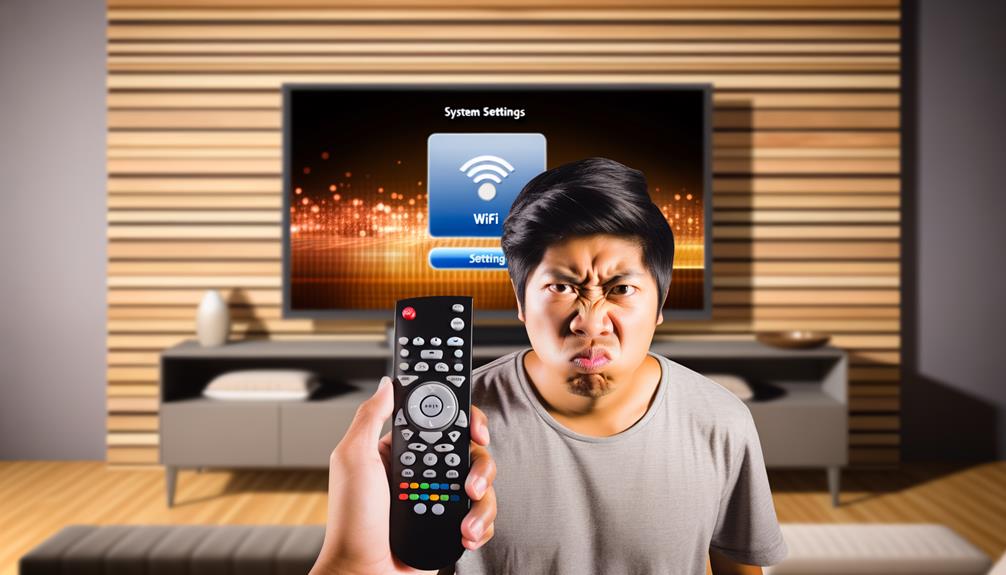
If moving the router closer to your Samsung TV does not resolve the Wi-Fi connectivity issues, another effective troubleshooting step is restarting the TV itself. This process refreshes the system, potentially clearing temporary glitches that hinder Wi-Fi connection.
To restart, power off the TV, unplug it from the power source, wait for a few minutes, then plug it back in and power it on. Ensuring the TV is completely powered off before unplugging is essential for a full restart.
This simple yet impactful troubleshooting step can greatly improve your connection troubleshooting efforts, enabling the TV to reconnect to Wi-Fi networks more effectively. Restarting the TV is a fundamental part of addressing Wi-Fi connection problems efficiently.
Updating TV Software
Updating the software of your Samsung TV can be a crucial step in resolving Wi-Fi connectivity issues by addressing bugs and enhancing overall system performance.
To guarantee a successful update, follow these software troubleshooting steps:
- Confirm your TV is connected to the internet.
- Navigate to the TV’s settings menu and locate the Support or Software Update section.
- Follow on-screen instructions to check for and install any available updates.
- Make sure a stable internet connection and sufficient storage space on the TV.
- Regularly check for updates to benefit from new features and improvements.
Performing Factory Reset
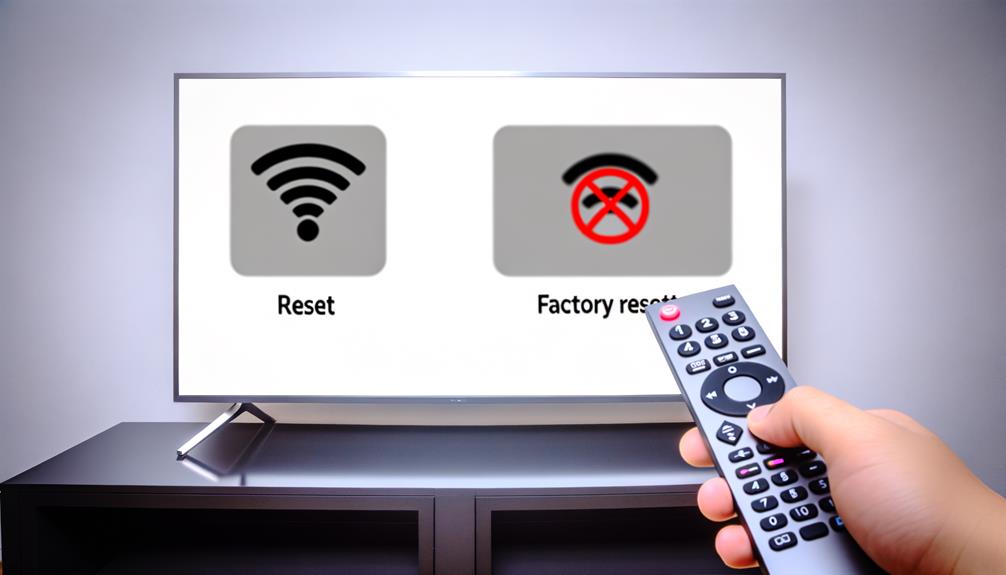
After ensuring your Samsung TV’s software is up-to-date, performing a factory reset can be a viable solution for persistent Wi-Fi connectivity problems. This procedure will erase all settings and data, restoring the TV to its original state. It can be accomplished through the TV’s menu settings or via physical buttons on the device. Prior to executing a factory reset, it is crucial to back up any important data or settings. Post-reset, the TV will need to be set up again, including reconnecting to the Wi-Fi network.
| Step | Description | Emotional Impact |
|---|---|---|
| Backup Data | Save important settings and data | Relief |
| Perform Factory Reset | Reset TV via menu or buttons | Hope |
| Reconnect to Wi-Fi | Set up TV and reconnect to network | Optimism |
| Test Connectivity | Verify if Wi-Fi issues are resolved | Satisfaction |
Contacting Support
Reaching out to Samsung Support can be a crucial step for resolving persistent Wi-Fi connectivity issues on your Samsung TV. Samsung offers multiple channels for contacting assistance, guaranteeing that you can receive help at your convenience.
Engaging with Samsung Support provides access to troubleshooting tips tailored to your specific situation, potentially resolving network connectivity issues efficiently.
- Utilize WhatsApp for 24/7 support.
- Engage in LiveChat with Samsung experts for immediate assistance.
- Call Samsung Support for personalized help.
- Visit an authorized service center for in-person troubleshooting.
- Provide feedback to improve Samsung’s support services.
These channels ensure thorough support, facilitating effective resolution of Wi-Fi issues and enhancing your overall experience with Samsung products.
Frequently Asked Questions
Why Is My Samsung TV Suddenly Not Connecting to Wi-Fi?
Your TV may not be connecting to Wi-Fi due to network interference or firmware issues. Troubleshooting steps such as restarting the router, updating firmware, and ensuring correct network settings can help resolve these connectivity problems.
Why Is My TV Not Connecting to Wi-Fi but Everything Else Is?
The issue could be due to Wi-Fi interference or incorrect router settings. Ensuring the router is configured properly and minimizing interference from other devices may resolve connectivity problems specific to your TV.
How Do I Fix My Samsung Not Connecting to Wi-Fi?
To address connectivity issues, make sure your TV has the latest software update. Verify the router settings, including SSID and password accuracy. Restart both devices and reset the TV’s network settings. Contact Samsung support if problems persist.
How Do You Reset Wi-Fi on Samsung Smart Tv?
To reset Wi-Fi on a Samsung Smart TV, access Network settings via Menu > Settings > General > Network > Open Network Settings. Select and delete the desired network, restart the TV, and reconnect to resolve potential router issues.
Conclusion
To sum up, addressing the issue of a Samsung TV not connecting to Wi-Fi involves several methodical steps. Identifying connection issues, checking network status, verifying Wi-Fi credentials, and restarting both the router and TV are initial measures.
Updating network settings and updating the TV software may provide further resolution. If these steps prove ineffective, performing a factory reset is recommended.
Persistent issues should warrant contacting support to guarantee optimal functionality and connectivity.
